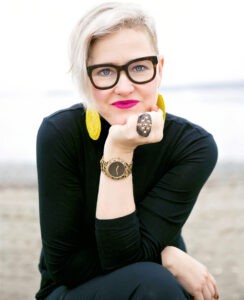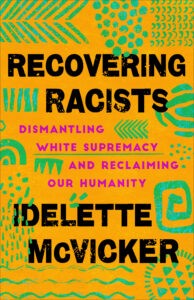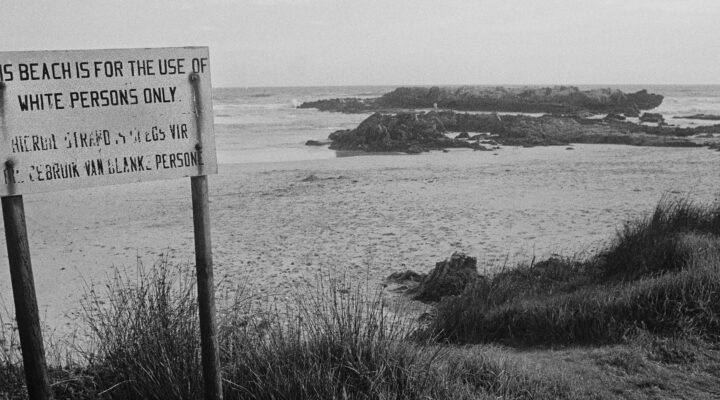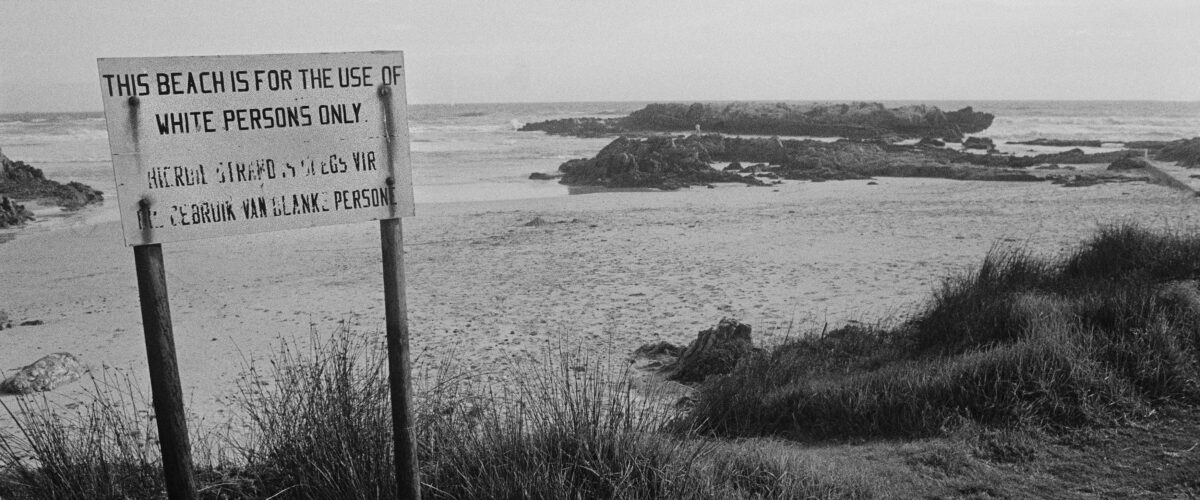Hi, my name is Idelette, and I am a recovering racist.
I am in recovery from the racist ideas that shaped my consciousness from the very moment I was conceived, amid one of the most racist social and political stories in history. I was born in South Africa, as an Afrikaner woman, during apartheid.
Apartheid literally means “separateness,” and it was an intricate system of laws that separated people based on the color of their skin from 1948 to 1994. It was a political system, a human-invented system that deeply divided society. The system of apartheid and the more than 300 years of colonized rule leading up to it robbed Black, indigenous and people of color of land, resources and education. It tried to rob people of dignity, strength and even language.

Idelette McVicker
Apartheid had done its work in such a deep way that when I left South Africa at the age of 23 — for work, for adventure and to find a more loving and inclusive world — I did not have any friends who were Black, indigenous or people of color.
I am now 48 years old. I have lived on three continents, and when I started this journey of recovering from apartheid, I believed what we had done in South Africa was one of the worst things in the world. In fact, the General Assembly of the United Nations had labeled apartheid a crime against humanity. As terrible as it was, I began learning that apartheid was not just a South African thing, or even an Afrikaner thing. I learned that the evil we needed to address, what had been around a lot longer, what took on different forms on different continents and in different periods in history is racism.
My recovery journey
I am in recovery from a system and a consciousness that had created a human hierarchy based on the color of someone’s skin. These were all personal ideas first, which then became political ideas, which then became policies and laws, which then became embedded into structures of injustice. Racist ideas also became embedded into our bodies and into our consciousness. I will most likely be in recovery for the rest of my life.
I hate racism and what it has done. I hate the pain it has caused, the structural inequality it has literally built into the land, and the economic inequality it has created and perpetuated. I hate it for the pain it causes Black, indigenous and people of color. I hate how it has killed and harmed and still kills and harms Black, indigenous, and people of color. I hate that we, white people, have done this. I also hate racism for how it has robbed white people of our humanity.
While I had been walking this journey out of apartheid for a long time, there was still something missing. I was running away from being called a racist, wanting to prove to the world I was not one of “those” people. Then I learned a more beautiful and liberating way: acknowledging my racism.
It was very early on a Friday morning in April 2016. Kelly Brown Douglas, Episcopal priest and author of Stand Your Ground, stood at the podium in a room full of mostly white people in Grand Rapids, Mich. The United States was in the throes of a presidential election campaign between the first-ever female presidential candidate and a former reality TV star. I was listening intently, furiously writing notes, when she said, “The only thing white people can ever be are recovering racists.”
Thud.
Did I hear correctly? I nudged my friend Kelley next to me. She nodded.
“The only thing white people can ever be are recovering racists.” As Douglas’ words landed in my heart, my body simply responded, “Yes.” It felt like my body acknowledged the truth of it before my mind did. I came to a state of quiet acknowledgment, feeling that a long restlessness had finally ended.
I had been on a quest for years to prove to the world how not racist I was. Sitting in that room, facing the ugliest of truths about myself and my story, I finally stopped hiding. I no longer needed to hide or to prove to the world that I was a good white person. I wasn’t.
“I had been on a quest for years to prove to the world how not racist I was.”
I was a recovering racist.
Racial sobriety
The Bible tells us that truth sets us free, although, if I am really honest, I was hoping for a different kind of truth. Not an ugly truth. Not this kind of truth.
Racial sobriety is that moment of hitting rock bottom, seeing our place in the human story clearly — no running, no hiding, no justification, no denial, no defensiveness. Only quiet, sober acknowledgment and acceptance of this very ugly truth. And right there, something else too: the beginning of liberation.
As I faced my ugliest self, I also was able to embrace my most whole self. I stopped scrambling for belonging. In that moment, I no longer had anything to prove — I couldn’t. I was as human, as broken and as beautiful as every other human being on this planet. I exhaled.
Only two years earlier, at a dinner party in our home, it was the thing I least wanted to admit. Being a racist was, for me, the most shameful thing I could ever be accused of. When somebody said the word “racist” at the table, jokingly indicting me and a handful of other white people at the table, I burst into tears. I was as fragile as white could be. The word “racist” carried deep shame for me because it was interconnected with my culture, my identity and the story of my people. I felt like I had something to prove to the world.
“Being a racist was, for me, the most shameful thing I could ever be accused of.”
I was born in South Africa in 1972, on the white side of the hospital. October is already spring in South Africa, but my mom says that day was so cold and miserable that she had to buy a new winter robe for her hospital stay. It was a cold and miserable season in the history of South Africa.
In 1948 the National Party, an ethnic, nationalist party that promoted Afrikaner interests in South Africa, gained political power and won elections based on their policy of racial segregation. Only white people had voting rights at that time, and after winning, the National Party began implementing a comprehensive set of laws to segregate people based on race. Afrikaner people made up only about 5% of South Africa’s population, and apartheid was how a white-minority government dealt with its presence in a majority Black country.
I was unaware of this political drama when I was born, and for the most part I grew up in a white bubble. Apartheid had achieved exactly what it had set out to do: separate people. It had created a “whites only” story for any white person who wanted to cling to that. I grew up steeped in Afrikaner nationalism, Afrikaner symbolism and Afrikaner history. I was raised to be proud of Afrikaner culture and accomplishments.
Raised as an Afrikaner
Perhaps it would help to clarify that there are two quite distinct cultural groups of white people in South Africa — those who are white and speak English and those who are white and speak Afrikaans. Only white South Africans who speak Afrikaans are called Afrikaners. Afrikaans, my mother tongue, is a Creole language consisting of Dutch mixed with Malay, Portuguese, Indonesian and the indigenous Khoekhoe and San languages. In spite of its rich and diverse origin story, Afrikaans was implemented as a weapon to strengthen Afrikaner nationalism.
For the first 18 years of my life, I grew up in an almost exclusively white, Afrikaans-speaking environment. Our house was in an all-white neighborhood. For 12 years of my life, I went to an all-white school with all instruction in Afrikaans (other than for our English classes, of course). Every Sunday we sat in an all-white, Afrikaans-speaking church. These white environments had been intentionally created by the racist laws of apartheid. My personhood was formed in one of the most extreme racist political systems in history.
“My personhood was formed in one of the most extreme racist political systems in history.”
In some sense, I had been not to the mountaintop of humanity but to the bleakest valley of whiteness. I imagine that the creators of apartheid had intended for me, as a daughter of apartheid, to reap only its privileges and its benefits. But how can you commit — and benefit from — a crime against humanity and not bear its weight?
Years later, sitting in that cold lecture hall in Grand Rapids, I was still struggling for clarity, healing and freedom from what I had learned and internalized during those first decades of my life. I was looking for any and every crumb of liberation in order to reclaim and recalibrate my humanity. I wanted to make the world better. I wanted to pay for that crime against humanity. I didn’t know how, but I was desperate to find a way. I knew I was not responsible for all of it, but I was responsible for my part.
“I am a recovering racist,” I told Kelly later that evening. It was the first time I had said those words out loud, and it felt important to do so.
She nodded. She knew.
 Idelette McVicker is founder and president of SheLoves Media Society, an online forum for Christian women that includes SheLoves Magazine and the Dangerous Women membership community. She is a popular speaker and retreat leader internationally. McVicker wrote the SheLoves manifesto, Let Us Be Women Who Love, which has been used by women’s ministries around the world and in Sarah Bessey’s book Jesus Feminist. After training as a journalist in South Africa, she lived in Taiwan, where she wrote for daily newspapers. McVicker moved to Canada in 1999 and lives in Surrey, British Columbia. This article is excerpted from her new book, Recovering Racists ©2022 and is used by permission of Brazos Press.
Idelette McVicker is founder and president of SheLoves Media Society, an online forum for Christian women that includes SheLoves Magazine and the Dangerous Women membership community. She is a popular speaker and retreat leader internationally. McVicker wrote the SheLoves manifesto, Let Us Be Women Who Love, which has been used by women’s ministries around the world and in Sarah Bessey’s book Jesus Feminist. After training as a journalist in South Africa, she lived in Taiwan, where she wrote for daily newspapers. McVicker moved to Canada in 1999 and lives in Surrey, British Columbia. This article is excerpted from her new book, Recovering Racists ©2022 and is used by permission of Brazos Press.
Related articles:
Baptist layman offers lessons from South Africa on overcoming civil war
Reject ‘rule of law’ hypocrisy and demand reparatory justice | Opinion by Wendell Griffen


